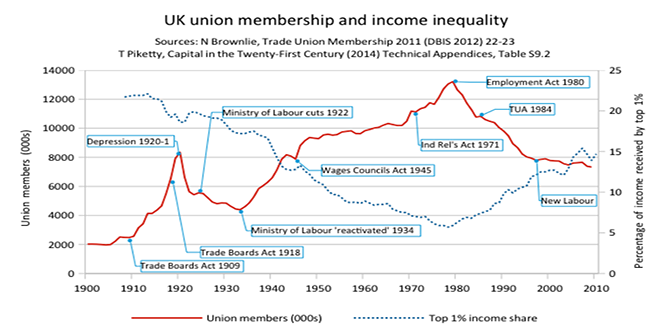The UK government has set out to crack down on “low-value” university degrees. Joseph Maslen examines the rhetoric underpinning this policy and discusses the implications for social mobility in the UK.
It is fair to say that the public in general likes the idea of social mobility – the American Dream-style idea that anyone should have the opportunity to achieve anything, and someone from humble origins can become a millionaire. However, what is not necessarily understood is that social mobility is a hotly contested concept. How much social mobility there should be, and whether social mobility is automatically a good thing, has been disputed by authors including Selina Todd, Stefan Collini, Diane Reay and David Goodhart. Now, in a move that seems to fly in the face of social mobility, the government plans to reduce the availability of the university courses often taken by working-class students. The reaction to this move by opposition politicians has been defiant.
Social mobility is a hotly contested concept
On Friday 14 July 2023, the Guardian broke the story of the government returning to its current on/off policy to curtail so-called “low-value” degrees at English universities – namely those “that do not have a high proportion of graduates getting a professional job, going into postgraduate study or starting a business”.
A closer look at the response
Notable, in the Guardian’s article, were the critical comments made by opposition spokespersons. Labour’s stated:
“After 13 years of failure in education, all the Conservatives and this out-of-touch prime minister have to offer are yet more barriers to young people’s aspirations [my italics] — rather than working to raise standards and outcomes. The difference between our parties couldn’t be clearer: Labour wants to smash the class [sic] ceiling while the Conservatives simply want to reinforce it [my italics].”
Similarly, the Liberal Democrat view was that: “It’s a cap on aspiration [my italics], making it harder for young people from disadvantaged backgrounds to go on to further study.”
It was striking that these responses, especially Labour’s, articulate the traditional (and disputed) liberal conception of social justice, evoking the idea of a “class ceiling” that needs to be “smashed”. This is a reminder of aspiration’s long association with explosive metaphors of primal struggle, dating back to the New Labour era of the 2000s and Alan Milburn’s Panel on Fair Access to the Professions. The title of both the Panel’s 2009 report and the then-Labour government’s January 2010 response was “Unleashing Aspiration”, and the metaphorical image of “aspiration” as a raging force was continued with the title of the coalition’s strategy document, which referenced “Breaking Barriers”, and even the Social Mobility Commission’s ensuing report “Cracking the Code”. The metaphor is no accident; the liberal conception of social justice is underpinned by an idea of fierce competition. Its principle is that each person – regardless of class, gender and race – is on a “level playing field”. A related metaphor is “the ladder”: the single-track idea of a (competitive) long-haul social mobility up to the prized professions via the all-important rungs of academic-style education.
The liberal conception of social justice is underpinned by an idea of fierce competition
Different paths
A counter-argument that there is not one big ladder, but multiple “smaller steps” or mini-ladders of aspiration, was put forward by the Conservative-aligned Katharine Birbalsingh in June 2022. She advocated it as a “Fresh Approach” both in her “Bucking the Trend” inaugural speech as Chair of the Social Mobility Commission and more fully in the Commission’s State of the Nation 2022 report published the same month. The controversy surrounding the agenda led to her resignation in January 2023; and political opposition to the agenda clearly remains strong. If a “class ceiling” is to be smashed, the message of the opposition parties implies, it is vital that “young people from disadvantaged backgrounds” retain the ability “to go on to further study” in courses that approximate to the (high-value) versions usually taken by young people from more advantaged backgrounds.
As Birbalsingh was derided, her “smaller steps” approach to social mobility was characterised as a negative attempt to reinforce the “class ceiling” and put a “cap” (or leash) on aspiration. Accordingly, Labour’s response above frames the government as “small c” conservatives detached from positive change, led by an “out-of-touch prime minister” unmoved, unlike Labour, by the aspirations of the working class.
What Birbalsingh should have made clearer, and what is relevant, is that she wanted to shift the terms of debate from quantitative to qualitative – away from the notion of a singular competition. Perhaps her agenda should not have been called “smaller steps”, but “different steps”. The turn to a relativistic, multi-polar definition is evident from a brief edit of what she told Schools Week she “really said” about social mobility:
“We want [people] to be the very best they can be […]. You will all have your own views about social mobility and what it means [my italics]. […] Having high expectations should not mean we judge everyone by the same measures [my italics]. We want to encourage and inspire everyone to be their best, but we also need to avoid prejudiced views […]. There are different social mobility narratives for different people [my italics], and we shouldn’t be putting them in hierarchies which implies that some are inferior to the others. We need them all.”
In practice, such a scenario of different narratives would not necessarily be regressive. Indeed, it is far from clear that the status quo (a single ladder of competition where there is only one measure of success) does not ultimately reinforce the class ceiling, along with stigma and shame via its “cruel optimism”.
Birbalsingh’s redefinition of social mobility provokes the following questions:
What are likely to be the future routes towards becoming middle-class?
It is fascinating to anticipate what the mid-21st century social mobility picture is going to be – how someone might “travel” from a disadvantaged background to become middle-class – by comparison with the 20th century past of “Peak Head” (the point in time when the relative availability of professional and managerial work – i.e. “head” or brain work – was at its highest).
What is the (socially constructed) concept of being middle-class thought to entail?
The dominant New Labour-style education-into-the-professions notion of social mobility has been critiqued in recent commentary as a form of “class narcissism” – an implicit view that there is one true way of being “middle class” and that it is an enviable existence. (Class narcissism links to Birbalsingh’s reference above to “prejudiced views” and “hierarchies”.) Maybe there are different roots and shapes of middle-class-style success and abundance revealed in different social mobility narratives.
The objection by opposition politicians to the “cap on aspiration” sidesteps those questions. Instead, it echoes the 2000s-era New Labour rhetoric of “breaking barriers” and fair access to the professions. Struggling to break free from that orthodoxy is a different way of thinking about social mobility. This emergent thinking is about social mobility in different vernaculars, and, figuratively speaking, social mobility taking different courses.
Note: the above draws on the author’s published work in The Political Quarterly.
All articles posted on this blog give the views of the author(s), and not the position of LSE British Politics and Policy, nor of the London School of Economics and Political Science.
Image credit: Photo by George Pak via Unsplash.







